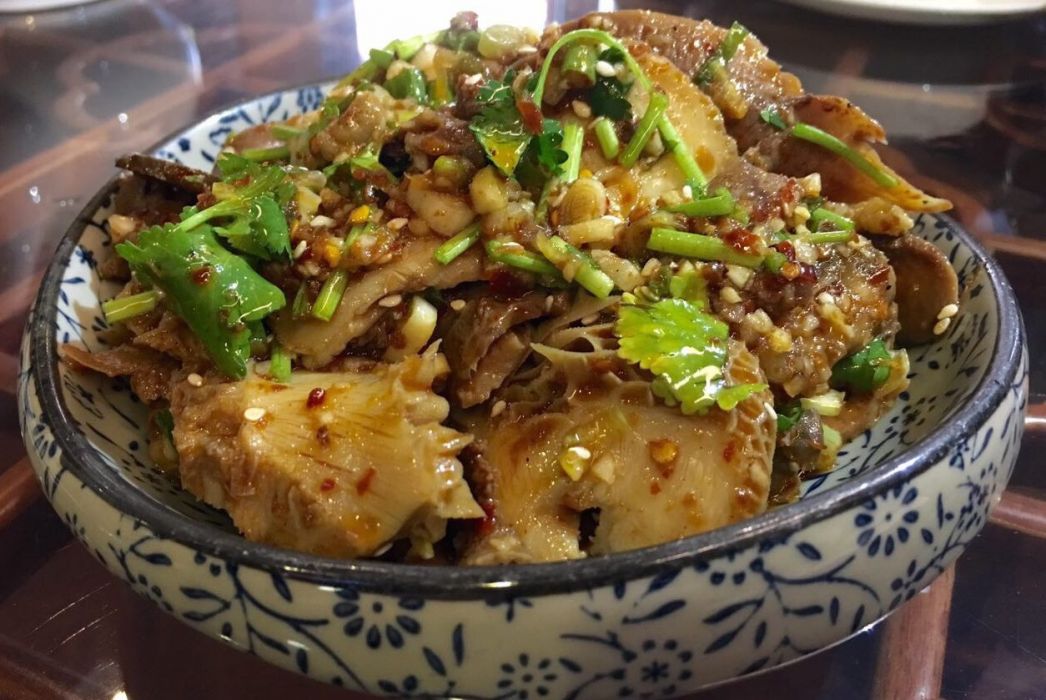Tucked away in a quiet part of Sai Yung Pun across from several auto repair shops is a friendly little neighbourhood Sichuan restaurant called Bashu Garden. Sai Ying Pun was historically a Chinese neighborhood, first settled in the late nineteenth century as Chinese immigrants to Hong Kong moved to the west of Sheung Wan, but were not permitted to dwell above High Street.
The area became a bustling commercial and residential neighborhood over the years and, with its proximity to Central and the new developments around Kowloon Station, eventually has become prime real estate for young local and expatriate professionals. High Street in particular ballooned as a restaurant destination in conjunction with the opening of the new Sai Ying Pun MTR station last year.

Bashu Garden at 113 High Street, on the west side of Western Street, is several blocks from the heart of this new “Soho West” neighborhood, but in contrast, has the feel of a restaurant that has been in the neighborhood for many years. Customers enter through the recessed door at street-level, next to a large window decorated with a red Chinese lantern pattern, and under a red and gold sign emblazoned with the restaurant’s name in Chinese characters. The unpolished concrete windowsill supports a series of houseplants to add to the neighbourly feel. The homey theme continues indoors with traditional Chinese-style furniture, friendly staff and even a television playing the news at low volume during lunch time.
I was not shocked though perhaps mildly surprised then to learn that Bashu Garden has itself only opened within the last year. Nonetheless, having tried the food now several times, I think Bashu Garden is a great place to go for a casual, moderately priced Sichuan meal that does not compromise on flavour even as it feels no need to challenge the diner to an Anthony-Bourdain-style extreme eating experience with ever increasing levels of spiciness.
For a cold appetiser, the Bamboo Shoots (HKD68), pickled and served with chopped pickled green chillies is a must-try. This dish is not on the printed menu but has been one of the specials handwritten in Chinese on the whiteboard each time I have been.
If you are dining with a group, I would also highly recommend the Mount Qincheng Wild Boar Cured Sausage (HKD138). Chinese sausage, known as lap cheong in Cantonese, is typically a dried, hard sausage made from pork and containing a high fat content.
The Mount Qincheng variety at Bashu Garden, named for a mountain in Sichuan that is known as a centre for Taoism, contains a rich tasting fatty wild boar meat in lieu of pork that is delicious but probably best shared amongst a larger group given the intensity of the flavour. For a hot version of a dish often served cold, the Sichuan Chilli Pork Offal (HKD96 – pictured up top) was redolent with chilli vapours but not too strong on the palate.

Fish in Mala Chilli Sauce
The signature mains at Bashu Garden consist of the classic Sichuan stews flavoured with dried chillies and the numbing Sichuan peppercorn, which is actually the dried berry of the prickly ash tree, known in Chinese as mala, literally “numbing spice”. Bashu Garden offers this dish with a number of variations including chicken, beef, fish and even frog. In each case, a large blue and white ceramic bowl is served filled with a red broth topped with a mound of dried red chillies and bright green coriander leaf.
On my last visit, we chose the Fish in Mala Chilli Sauce (HKD238) where the broth was stocked with a whole freshwater grass carp, or wan yu in Cantonese, chewy konyaku noodles, spongy bean curd infused with the flavour of the mala broth and a thick stew of bean sprouts and chopped green vegetables. The fish itself was soft and tender in bite-size pieces for easy consumption. However, as it was cooked on the bone, diners do need to be attentive and beef or chicken might be a better choice if that seems problematic.
The spicy Sichuan food goes well with plain white rice. However, for an additional carbohydrate, Bashu Garden’s Dan-Dan Noodles (HKD45) are not the same old thin noodles in thick peanut sauce like you might try in a Cathay Pacific lounge. Rather, here the noodles are flat, wide, shaved noodles with crinkly edges for a bit of texture and to better capture the flavour of a savoury chilli sauce flecked with chopped peanuts and minced pork.
All in all, it was no surprise to confirm that the chef at Bashu Garden does indeed hail directly from Sichuan province. As an additional note, Bashu Garden offers very reasonably priced lunch sets ranging from HKD45 to HKD90, plus student discounts befitting a location within a short walking distance down the hill from HKU. Thus, whether you feel more like a hungry lawyer or a starving law student, either way, Bashu Garden should leave you sated.
About the Hungry Lawyer: Marc Rubinstein, born in Baltimore, USA, has been in Asia for nearly 20 years with 13 of those in Hong Kong. He has split his career between banks and law firms, and is currently the general counsel of an Asia-based real estate and alternative energy investor. Marc is a co-founder and co-chair of the Hong Kong Gay & Lesbian Attorneys Network, and previously chaired the Nomura Gay & Lesbian Network, Asia. In addition to being a hungry lawyer, he has run three marathons, eight half-marathons and completed the Hong Kong Oxfam Trailwalker.
Other columns from the Hungry Lawyer:
Hungry Lawyer: Traditional Cantonese Food with Style at Lai Bun Fu
Hungry Lawyer: Amigo, the French Restaurant with a Spanish Name Where You Can Dine Like it’s 1979
Hungry Lawyer: The traditional and the hip of Korean food in Hong Kong
Hungry Lawyer: Quick eats and coffee without leaving Hong Kong Land
Hungry Lawyer: The Mandarin’s Stilton Cheese Soup is back!




